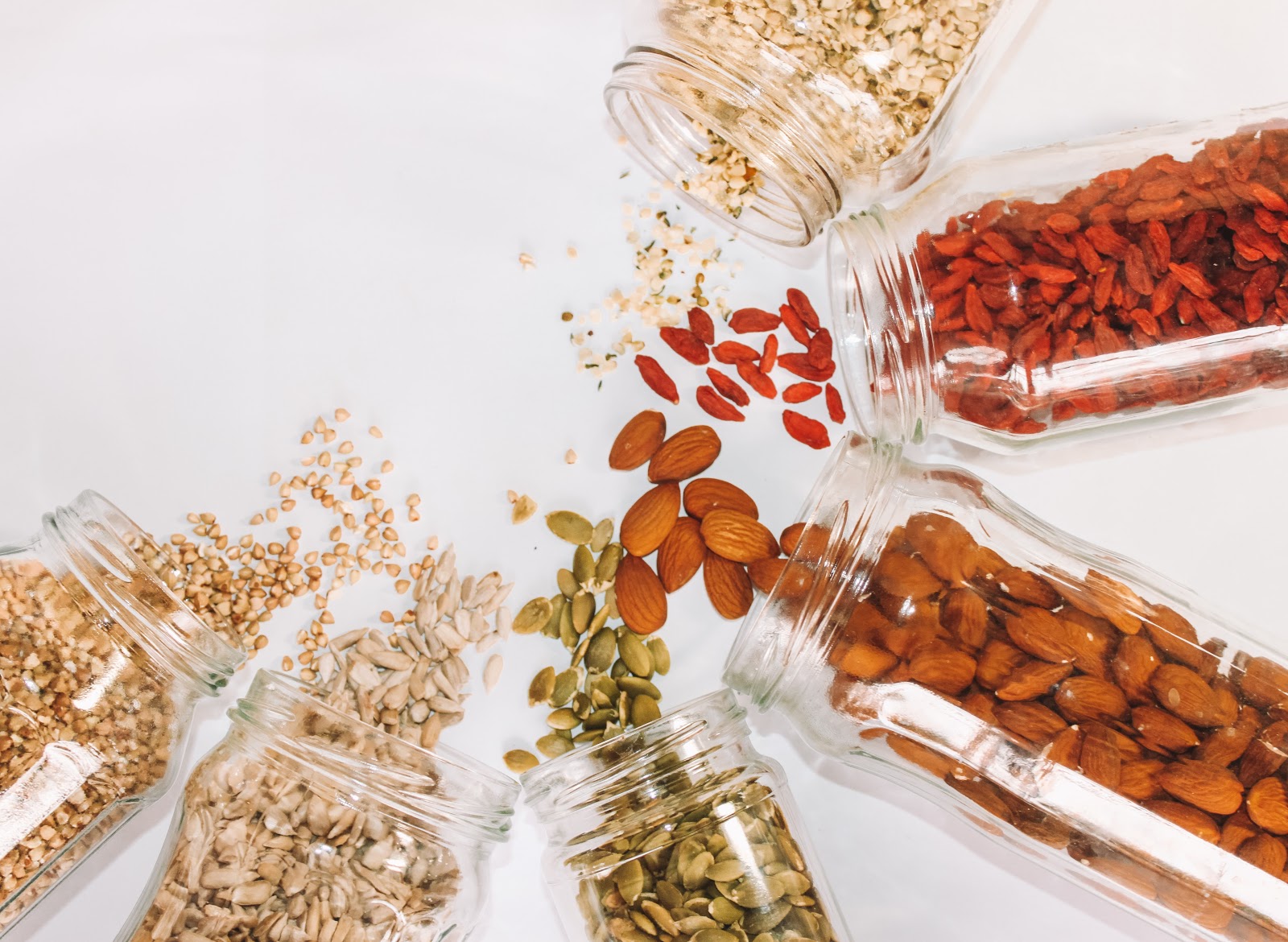If you’ve recently transitioned to a plant-based diet, you might be wondering how to balance your intake of necessary nutrients. Like, can you eat nuts on a plant based diet? It’s true that animal-based products are rich in protein and fats, both of which are essential for your health. However, you can easily replace meats and dairy with plant-based alternatives. In particular, nuts can play a vital role.
What Are Nuts?
Before we consider whether you can eat nuts on a plant based diet, let’s take a look at what nuts actually are.
The botanical definition of a nut is simply a “dry hard fruit that does not split open at maturity to release its single seed”. In the culinary world, however, many foods that are actually legumes or fruits are also considered to be nuts.
Typically, anything that resembles a fruit or a seed in a harder outer shell falls under the category of nuts. Thus, many goods we naturally think of as nuts are actually a different category of foods. For instance, peanuts are legumes.
Almonds, cashews, macadamias, pistachio, and walnuts are all seeds, which is technically a different category. For now, however, we will use the common culinary definition of nuts and will include the foods listed above.
Are Nuts Good For You?

Yes, absolutely! Nuts contain a lot of monounsaturated fats and polyunsaturated fats, which reduce levels of ‘bad’ cholesterol (LDL) in your blood. Nuts are full of minerals, vitamins, and antioxidants, including potassium, magnesium, calcium, and Vitamin E.
Not only you can eat nuts on a plant-based diet, but you definitely should do so for many reasons. Here are some of the top reasons to eat nuts:
Weight Loss
Omega-3 fatty acids, also present in the majority of nuts, can improve your skin and lower blood pressure. Nuts are calorie-dense, which though sounds problematic, can actually help to lose weight. When consumed in moderation, nuts have been linked to weight loss.
This is because nuts support appetite control and help maintain adequate blood sugar levels, which prevents you from craving sweets. Nuts, except for chestnuts, are also packed with protein. It may lower levels of ghrelin – the hunger hormone – helping you lose weight.
Heart Diseases, Cancer, Diabetes
Research conducted in Imperial College London in 2016 analyzes the existing research regarding the effects of nuts on our health. The authors conclude that a handful of nuts a day reduces the risk of coronary heart disease “by nearly 30 percent”.
Moreover, “their risk of cancer [is reduced] by 15 percent, and their risk of premature death by 22 percent”. Such a seemingly small amount of nuts was also linked to reduced chances of diabetes by 40% percent
Moderation is Key
Though you can eat nuts on a plant-based diet, you should remember to keep your diet balanced. As beneficial as they are, nuts should be consumed in moderation, just like any other food.
Australian Dietary Guidelines suggest limiting the consumption of nuts to 30-40 grams a day. Can you eat nuts on a plant-based diet? Yes, but beware of how many delicious nuts you consume due to the high concentration of fat.
5 Healthiest Nuts For a Plant-Based Diet
Peanuts
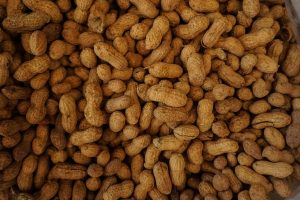
Are Nuts High in Protein? Yes. Peanuts have the highest levels of protein among nuts, making them perfect for plant-based diets that can often lack protein. Though peanuts are usually thought of as nuts, they are actually legumes.
Nevertheless, the similarities, as well as the name, forced peanuts into the nuts category over the years.
As you can see in the chart below, peanuts are full of nutrients that can positively affect your health. In addition, peanuts contain more than 30 different vitamins and minerals.
| Per 100 g | Protein | Unsaturated (‘good’) Fats | Fiber | Calcium | Magnesium | Calories |
| Peanuts | 25.80(g) | 39.98(g) | 8.5(g) | 92(mg) | 168(mg) | 567 |
Peanuts are among the healthiest nuts you can find since they contain a lot of protein. Protein is of utmost importance for the body since your body uses protein as a building block for muscles, bones, skin, blood, hair, and nails.
Protein repairs and creates new cells, as well as boosts growth. Failure to consume a sufficient amount of protein can result in the loss of muscle mass. Many studies link peanuts to weight loss and reduced risks of cardiovascular diseases.
The American Heart Association (AHA) claimed peanuts as “heart-check certified,” which means that they are likely to decrease the risks of heart diseases. Though high in fat, peanuts have been repeatedly linked to weight loss and the prevention of obesity.
Peanuts are rarely consumed raw, like other nuts. Instead, they are roasted or caramelized and consumed either whole or in a form of peanut butter.
It is worth mentioning that peanuts are popular allergens. Allergic reactions from peanuts can be life-threatening, so be mindful of how your body responds to them. (Let’s find a link here for how to
Almonds
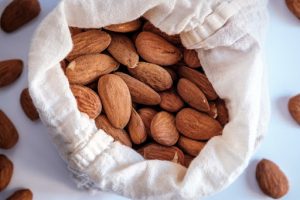
Almonds are among the most popular nuts. They are usually consumed raw or roasted.
| Per 100 g | Protein | Unsaturated (‘good’) Fats | Fiber | Calcium | Vitamin E | Calories |
| Almonds | 21.15 (g) | 43(g) | 12.50 (g) | 269(mg) | 25.63(mg) | 579 |
Notably, Almonds are rich with Vitamin E, which is a fat-soluble antioxidant. Multiple studies claim that a sufficient intake of Vitamin E decreases rates of Alzheimer’s disease, heart diseases, and cancer.
Almonds also contain a lot of antioxidants, which can be found in the brown layer of the skin. If you want a sufficient intake of antioxidants, avoid bleached or peeled almonds.
Almonds are also quite high in Magnesium, which has been linked to blood sugar control. Studies reveal that almost 40% of those who are diabetic have Magnesium deficiency. Thus, for those who struggle with type 2 diabetes, Almonds can help balance blood sugar levels.
Besides, Magnesium takes part in more than 300 biochemical reactions in your body. It has some anti-inflammatory benefits, can prevent migraines and depression… the list goes on and on.
You can easily add sliced almonds to your oatmeal or salads, as a part of your plant-based diet. If you are considering weight loss, replace your usual snacks with almonds, or your other favorite nut.
Pistachios
These nuts originate from Central Asia and the Middle East. Surprisingly, pistachios have been linked to improving eye health, among other health benefits.
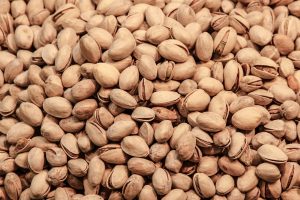
Many may be familiar with pistachios because of the common ice-cream flavor, or a snack. These nuts are as healthy as they are popular, as they contain a variety of nutrients and vitamins.
| Per 100 g | Protein | Unsaturated (‘good’) Fats | Fiber | Calcium | Iron | Calories |
| Pistachios | 20 (g) | 46.5(g) | 11 (g) | 105(mg) | 3.92(mg) | 560 |
Research shows that Pistachios are full of lutein and zeaxanthin, antioxidants that are vital for healthy eyes. American Optometric Association revealed that these antioxidants decrease the risks of various eye conditions, such as cataracts or macular degeneration.
As pistachios, just like all nuts, are rich in fiber, they benefit the digestive system and gut health in particular. A 2012 study suggested that consuming around 85 grams of pistachios a day can increase helpful gut bacteria that can prevent constipation.
The high concentration of fiber may also contribute to reduced risks of colon cancer. Notably, whether pistachios are raw or roasted doesn’t change it’s health benefits in relation to cancer, a 2017 study found.
Raw pistachios can be a delicious snack or can be grounded in a blender. The resulting nut mix can be added to smoothies, oatmeals, or can even be used for baking.
Cashews

Unsalted, raw cashews have a creamy texture and are often used in Indian cooking, as well as vegan recipes.
| Per 100 g | Protein | Unsaturated (‘good’) Fats | Fiber | Calcium | Iron | Calories |
| Cashews | 18.22 (g) | 31.5(g) | 3.30(g) | 37(mg) | 6.68(mg) | 553 |
Traditionally, cashews were used to treat various illnesses before modern medicine was born. Cashews are valued for their nutritional benefits, particularly for high levels of copper and magnesium.
Cashews can be beneficial for your bones and joints. In particular, copper and magnesium improve the bone mass, keep the joints flexible and bones strong. Magnesium also relaxes your nerves, mostly in muscles, because it doesn’t let calcium over-activate nerve cells.
Copper is utilized in the generation of collagen and hemoglobin. Since collagen is the main building block of your skin and hair, cashews can help improve their elasticity. Furthermore, cashews are lower in fat than other nuts but are still relatively high in fiber.
This makes them a perfect choice for those who wish to lose weight. Fiber keeps you full for longer while other nutrients provide enough calories and energy. Similarly to pistachios, cashews provide us with antioxidants that improve your sight and prevent eye diseases.
What Nut is Healthiest?
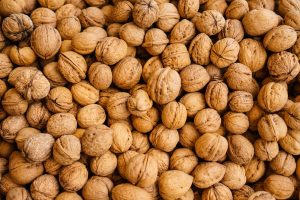
Walnuts
If you were wondering which nut is the healthiest, the answer is probably the Walnut.
| Per 100 g | Protein | Unsaturated (‘good’) Fats | Fiber | Calcium | Iron | Calories |
| Walnuts | 15.23 (g) | 31.5(g) | 6.7(g) | 98(mg) | 2.91(mg) | 654 |
In 2011, an American scientist Dr. Joe Vinson proclaimed walnuts to be the best nuts out there. This is because walnuts contain twice as many antioxidants as any other nut. Moreover, the antioxidants found in walnuts are better quality and potency, Dr. Vinson said.
Antioxidants are essential because they fight toxins, viruses, and even cancer cells. Essentially, antioxidants prevent some types of cell damage. Some observational studies declare walnuts good prevention from some cancers, such as prostate and breast cancers.
Walnuts are also linked to healthy aging, as they maintain physical abilities as you get older. One study found that diets containing walnuts reduce the risk of physical impairment by 13%. Moreover, walnuts promote brain function and better memory.
Notably, male fertility and general reproductive health might also be improved by eating walnuts.
Roasted or Raw Nuts?

Often, nuts are roasted for better taste and crunchiness. You can roast nuts either with or without oil in a frying pan or an oven. Roasting nuts may slightly change their chemical composition but most experts agree that the difference in nutritional values is minimal.
Though you might think that roasting nuts in oil will increase the amount of fat in them, this is false. Since nuts are already rich in fat, they actually cannot absorb more fats when roasted. Thus, the difference in fats is quite small.
For example, raw cashews contain 553 calories per 100 grams, while cashews roasted in oil have 580 calories.
Some raw nuts may contain harmful bacteria, especially salmonella. In particular, dangerous bacteria were found in pistachios, almonds, and walnuts. Heat destroys bacteria, thus roasting can sometimes be beneficial.
On the other hand, roasting fosters acrylamide, a chemical that is associated with cancer. Although studies didn’t find a direct link between acrylamide and cancer, there was a slight connection.
Are Nut Butters As Healthy As Nuts?
Generally, nut butter has the same nutritional value as nuts. Nut butter also contains a lot of protein, unsaturated fats, fiber, and antioxidants.
If you are wondering what nut butter is the healthiest, the answer depends on which nutrients you’re looking for. Peanut butter, for example, has the largest amounts of protein.
Allison Childress, a chief clinical dietitian, believes that almond butter is among the healthiest kinds of nut butter you can find.
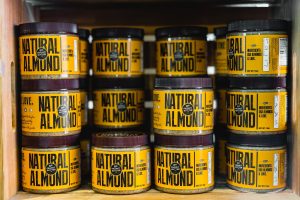
Nevertheless, there are multiple reasons to choose whole nuts over nut butter.
First of all, nut butter is typically more calorie-dense than nuts. Considering that nuts are already quite full of calories, consuming too much nut butter can contribute to gaining weight.
Of course, some good old peanut butter won’t lead to obesity, but try choosing nuts over nut butter.
Another reason why you should choose nuts over nut butter is that nuts require chewing, thus making you slow down. This actually helps your digestion and reduces the risk of choking.
An obvious reason to avoid nut butter is that it is usually highly processed. Producers of nut butter add sugar, acids, additional oils, and emulsifiers. Though they don’t necessarily pose grave danger, you should always choose whole foods over processed foods.
Why Are Nuts Important For a Plant-Based Diet?
Apart from the excellent health benefits nuts offer, they are particularly useful for someone who is vegan. It can be challenging to receive the necessary intake of nutrients from plant based foods. As a result, some people end up deficient in crucial nutrients.
Nuts provide a lot of those nutrients, in particular protein and iron. Fruits and vegetables, especially those that are rich with Vitamin-C, help your body absorb the nutrients better.
So, can you eat nuts on a plant based diet? Absolutely! Beware of calories and keep the amounts moderate, and your diet will be enriched with the flavor of various nuts.
You may also like: WHAT CAN YOU EAT ON A PLANT BASED DIET? >>CLICK HERE!

